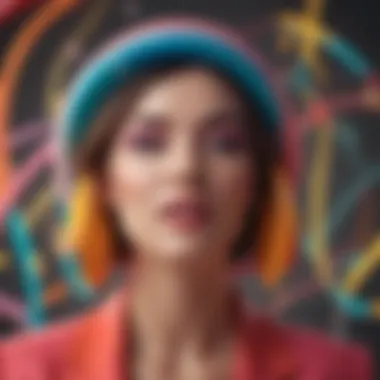Discovering the Pinnacle of Comedy: Unveiling the Greatest Films of All Time


Trend Report
When delving into the realm of comedy films, it becomes imperative to acknowledge the trends that have shaped this genre over the years. From slapstick humor to sophisticated wit, the evolution of comedy on the silver screen has been a fascinating journey. Analyzing the latest trends in comedy filmmaking offers a glimpse into the dynamic landscape of humor in cinema. This section will explore the nuances of comedic trends that have resonated with audiences worldwide, shedding light on the intricacies of creating laughter through storytelling and performance.
Style Guides
In the realm of comedy films, style extends beyond fashion and beauty to encompass the unique flair of each comedic genius gracing the screen. From the eccentric wardrobe choices of iconic comedians to the subtle nuances of comedic timing, style guides in comedy delve into the art of eliciting laughter through visual and performative elements. This section will unravel the wardrobe essentials of legendary comedy characters, provide insights into the styling tips employed by comedic actors, and offer body shape guides that complement the diverse range of comedic personas portrayed on film.
Beauty Tips & Hacks
While laughter reigns supreme in comedy films, beauty tips and hacks play a supporting role in enhancing the allure of comedic performances. Makeup techniques utilized to transform actors into outrageous characters, skincare routines ensuring actors maintain a radiant on-screen presence, and DIY beauty hacks to create comedic effects - all contribute to the immersive experience of comedic storytelling. This section will delve into the behind-the-scenes beauty secrets of comedy films, shedding light on the meticulous processes that culminate in the seamless integration of beauty and humor on screen.
Product Reviews
In the realm of comedy films, the costumes worn by characters, makeup products applied, and overall aesthetic presentation play a pivotal role in bringing laughs to life. Fashion reviews of iconic comedic ensembles, beauty product evaluations determining their efficacy in creating comic effects, and personal accounts of trying and testing beauty and fashion products all contribute to understanding the meticulous craft behind comedic appearances. This section will offer in-depth product reviews, shedding light on the intricate details that contribute to the success of comedic aesthetics on screen.
Celebrity Fashion & Beauty
Celebrity presence in comedy films often elevates the sartorial and beauty standards portrayed on screen. Red carpet looks of comedic actors, celebrity style icons inspiring comedic fashion trends, and insider beauty secrets shared by comedic celebrities - all enrich the exploration of fashion and beauty in comedy films. This section will review the impact of celebrity fashion and beauty in shaping comedic aesthetics, offering readers a glimpse into the glamorous world of laughter and style intertwined in cinematic brilliance.
Introduction
The world of cinema is replete with a diverse array of genres, each offering a unique lens through which to view the human experience. In this rich tapestry of storytelling, comedy stands out as a beacon of light, invoking laughter, joy, and introspection in equal measure. Through the art of humor, filmmakers have been able to explore the complexities of life, relationships, and society with unparalleled wit and nuance. This article embarks on a journey through the annals of cinematic history to unravel the enduring charm and significance of comedy films across the decades.
Defining Comedy in Films
Comedy in films transcends mere laughter; it serves as a mirror reflecting the absurdities and intricacies of the human condition. Defined by its ability to provoke amusement and entertainment, comedy encompasses a wide spectrum of humorous elements, from slapstick and satire to wit and irony. Filmmakers harness its power to evoke emotions, challenge conventions, and offer fresh perspectives on familiar themes. By dissecting the essence of comedy in films, we can gain a deeper appreciation for its role as a catalyst for laughter, introspection, and societal critique.
The Significance of Comedy as an Art Form
Comedy, as an art form, occupies a distinctive place in the cultural landscape, transcending linguistic and cultural boundaries to unite audiences through laughter. Its significance lies in its ability to humanize characters, dissolve tension, and provoke thought in a lighthearted manner. Comedy not only entertains but also serves as a tool for social commentary and empathy, allowing viewers to engage with delicate topics through a lens of humor and levity. As a testament to its enduring appeal, comedy continues to evolve, adapting to modern sensibilities while retaining its timeless essence as a universal language of joy and connection.
Purpose of the Article


The purpose of this article is twofold: to celebrate the unparalleled artistry and impact of the best comedy films of all time and to provide readers with a comprehensive guide to navigating the vast and varied landscape of comedic cinema. By delving into the classics, modern masterpieces, cult favorites, and global perspectives on comedy, we aim to curate an enriching exploration that honors the creative vision and cultural significance of comedies across eras and continents. Through this odyssey of laughter and insight, readers are invited to rediscover old favorites, unearth hidden gems, and embark on a cinematic journey that celebrates the timeless allure of comedy in the world of film.
Classics That Stand the Test of Time
When delving into the realm of comedy films, it is imperative to pay homage to the classics that have stood the test of time and continue to enthrall audiences decades after their release. These cinematic masterpieces serve as pillars in the evolution of comedy on screen, showcasing the enduring relevance of humor in storytelling. From the silent era to the golden age of Hollywood, these films have influenced generations of filmmakers and established a standard of excellence in the genre.
City Lights ()
'City Lights,' directed by and starring Charlie Chaplin, remains a poignant showcase of silent comedy at its finest. The film adeptly blends slapstick humor with heartfelt emotion, showcasing Chaplin's iconic Tramp character navigating the complexities of urban life with sincerity and grace. Through its timeless themes of love, friendship, and societal struggles, 'City Lights' continues to charm audiences with its universal appeal and artful execution, making it a quintessential classic in the comedy genre.
Some Like It Hot ()
'Some Like It Hot,' directed by Billy Wilder, stands as a trailblazer in blending screwball comedy with elements of farce and romance. The film's witty script, charismatic performances by Marilyn Monroe, Tony Curtis, and Jack Lemmon, and expert direction create a symphony of comedic brilliance that resonates with audiences to this day. With its sharp social commentary and boundary-pushing narrative, 'Some Like It Hot' redefined the parameters of comedy in film and solidified its status as a timeless favorite among cinephiles.
Dr. Strangelove ()
Stanley Kubrick's 'Dr. Strangelove' revolutionized political satire in cinema, using dark humor to dissect the absurdities of Cold War paranoia and nuclear brinkmanship. The film's bold performances, razor-sharp dialogue, and satirical edge offer a piercing critique of societal anxieties while eliciting both laughter and introspection from viewers. As a benchmark in satirical comedy, 'Dr. Strangelove' remains a relevant and thought-provoking classic that continues to spark discussions on the use of humor to address grave issues.
Annie Hall ()
'Annie Hall,' directed by and starring Woody Allen, redefines romantic comedy by infusing wit, introspection, and artistic innovation into the genre. The film's non-linear narrative, existential musings, and neurotic humor capture the complexities of modern relationships with refreshing honesty and humor. Through its unconventional storytelling and compelling characters, 'Annie Hall' transcends conventional comedy conventions to become a poignant reflection on love, loss, and self-discovery, earning its rightful place as a classic in cinematic history.
Evolution of Comedy on Screen
In this fascinating exploration of comedy in films, the Evolution of Comedy on Screen stands out as a pivotal topic. Understanding the evolution of humor on the big screen is crucial to appreciating the intricate artistry behind comedic narratives. As comedy has progressed over the years, filmmakers have pushed boundaries, experimented with new forms of humor, and challenged societal norms. The Evolution of Comedy on Screen sheds light on how humor has evolved as a reflection of changing times and cultural shifts, making it a cornerstone of this article.
Satirical Brilliance in Modern Comedy
The Great Dictator ()
The Great Dictator (1940) holds a special place in the landscape of comedy for its bold and satirical take on political commentary. Charlie Chaplin's iconic film masterfully blends humor with poignant social critique, a daring move during a politically turbulent era. The film's key characteristic lies in Chaplin's dual role as both a ruthless dictator and a humble Jewish barber, cleverly weaving together satire and humanism. By using comedy as a vehicle for addressing authoritarianism and tyranny, The Great Dictator (1940) delivers a powerful message that resonates even today. Its unique feature of blending humor with socio-political relevance ensures its enduring popularity and relevance in cinematic history.
Network ()
Network (1976) emerges as a standout film in the realm of satirical modern comedy for its razor-sharp commentary on media sensationalism and corporate influence. The film's key characteristic lies in its fearless portrayal of the manipulation of news for profit, a theme that remains alarmingly relevant in today's media landscape. With its dark humor and unflinching portrayal of societal ills, Network (1976) challenges viewers to question the authenticity of news and the commodification of truth. While its confrontational approach may polarize audiences, Network (1976) remains a valuable choice for this article due to its incisive social commentary and lasting impact on audiences.


Comedy in the Age of Superheroes
Deadpool ()
Deadpool (2016) disrupts the traditional superhero genre with its irreverent and self-aware humor, carving a unique niche in the realm of comedic superhero films. The key characteristic of Deadpool (2016) lies in its meta-textual humor, breaking the fourth wall and engaging audiences in a playful dialogue. This aspect, coupled with its blend of action and comedy, makes Deadpool (2016) a refreshing and popular choice for this article. Its unique feature of subverting superhero tropes while delivering laughs distinguishes it as a beneficial addition to the discussion of comedy in the age of superheroes.
The LEGO Batman Movie ()
The LEGO Batman Movie (2017) offers a light-hearted and visually dynamic take on the superhero genre, infusing humor with the whimsical world of LEGO animation. The key characteristic of this film is its playful and comedic exploration of Batman's character, adding depth to the familiar superhero persona. By embracing parody and intertextuality, The LEGO Batman Movie (2017) entertains audiences across age groups, making it a popular choice for inclusion in this article. Its unique feature of combining comedy with superhero antics provides a delightful blend of entertainment, positioning it as a valuable contender in the contemporary landscape of comedic superhero films.
Cult Favorites and Hidden Gems
Exploring the realm of 'Cult Favorites and Hidden Gems' within the context of this article provides a unique opportunity to unearth lesser-known comedic treasures that have significantly contributed to the genre's richness and diversity. Delving into these hidden gems not only offers a refreshing alternative to mainstream comedy but also exposes audiences to innovative storytelling and unconventional humor approaches. By shedding light on these less-celebrated works, viewers can expand their comedic horizons, gaining a deeper appreciation for the nuances and complexities present in offbeat comedic creations.
Office Space ()
Released in 1999, 'Office Space' stands out as a cult classic due to its witty portrayal of mundane office life and satirical take on corporate culture. The film's enduring popularity stems from its ability to resonate with audiences through its relatable depiction of workplace frustrations and the desire for individuality amidst a monotonous environment. 'Office Space' masterfully blends humor with sharp social commentary, offering a comedic lens through which viewers can reflect on their own professional experiences and societal norms.
In Bruges ()
'In Bruges,' a hidden gem from 2008, presents a darkly comedic tale that deftly navigates themes of guilt, redemption, and morality within the unlikely setting of Bruges, Belgium. The film's understated humor and profound character development set it apart as a nuanced exploration of human nature, where laughter often intertwines with introspection. 'In Bruges' challenges typical comedy conventions, opting for a more subtle and contemplative approach that lingers in the minds of the audience long after the credits roll.
The Grand Budapest Hotel ()
Wes Anderson's 'The Grand Budapest Hotel,' released in 2014, emerges as both a cult favorite and a hidden gem for its visually stunning aesthetics, whimsical storytelling, and stellar ensemble cast. This cinematic masterpiece blends comedy with elements of mystery and nostalgia, inviting viewers into a meticulously crafted world filled with quirky characters and intricate plot twists. 'The Grand Budapest Hotel' exemplifies the art of visual comedy, utilizing vibrant colors, intricate set designs, and deadpan humor to create a symphony of laughter and emotive depth.
Global Perspectives on Comedy
In this extensive exploration of the best comedy films of all time, delving into global perspectives on comedy is crucial to gaining a well-rounded view of this cinematic genre. By examining comedic ventures from different cultural backgrounds, we can appreciate the diverse ways humor is expressed and interpreted worldwide, enriching our understanding of comedy as a universal language that transcends geographical boundaries. Bollywood's contribution to comedy cannot be understated, with its unique blend of vibrant storytelling, colorful aesthetics, and lively performances captivating audiences for decades.
Bollywood's Comedy Ventures
Andaz Apna Apna ()


In the realm of Bollywood comedy, "Andaz Apna Apna" (1994) stands out as a timeless classic that continues to charm audiences with its slapstick humor and eccentric characters. This film's distinctive feature lies in its comedic timing and over-the-top performances, creating a whimsical narrative that delights viewers of all ages. Its enduring popularity is a testament to the film's ability to evoke laughter and merriment while showcasing the comedic prowess of Indian cinema. Despite its simplistic storyline, "Andaz Apna Apna" excels in capturing the essence of light-hearted comedy, making it a beloved choice for inclusion in this article.
Hera Pheri ()
Another iconic Bollywood comedy, "Hera Pheri" (2000) is revered for its impeccable blend of situational humor, witty dialogues, and memorable performances by the ensemble cast. The key characteristic of this film lies in its ability to interweave humor with underlying social commentary, providing a clever commentary on everyday struggles through a comedic lens. "Hera Pheri"'s unique feature is its seamless transition between comedy and drama, maintaining a delicate balance that resonates with audiences seeking both entertainment and depth in storytelling. While it may not possess the slapstick charm of other comedies, "Hera Pheri" compensates with its astute wit and relatable character dynamics, making it a valuable addition to this exploration of Bollywood comedy.
French Comedy's Artistic Flair
French cinema offers a distinct perspective on comedy, characterized by its artistic flair and unconventional storytelling techniques. Films such as "The Intouchables" (2011) and "Am\u00e9lie" (2001) exemplify the sophistication and nuance of French humor, appealing to audiences with their charming narratives and elegant cinematography. By highlighting the emotional depth and philosophical undertones present in French comedies, this section aims to shed light on the cultural richness and aesthetic beauty that define this unique cinematic tradition.
The Intouchables ()
"The Intouchables" (2011) stands out for its heartwarming portrayal of an unlikely friendship between a disabled man and his caregiver, blending humor with poignant moments to create a touching story that resonates on a profound level. The film's key characteristic lies in its ability to address serious themes with sensitivity and humor, offering a refreshing take on human relationships and personal growth. "The Intouchables"' unique feature is its uplifting spirit and genuine performances, making it a treasured gem in the realm of French comedy. While some may find its sentimentality a tad predictable, the film's emotional resonance and powerful message make it a worthy inclusion in this examination of global comedy.
Am\u00e9lie ()
"Am\u00e9lie" (2001) embodies the whimsical charm and visual splendor of French cinema, enchanting audiences with its imaginative storytelling and fairy-tale-like aesthetics. The key characteristic of this film lies in its enchanting protagonist and her quest for happiness, blending fantasy with reality in a seamless narrative that celebrates the magic of everyday life. "Am\u00e9lie"' unique feature is its visual poetry and intricate attention to detail, creating a vibrant tapestry of emotions and experiences that captivate viewers from start to finish. While some may critique its idealistic portrayal of Paris, "Am\u00e9lie"'s artistic sensibilities and thematic depth make it a valuable addition to this exploration of French comedy.
Impact of Comedians Turned Filmmakers
Comedians transitioning into filmmakers play a pivotal role in shaping the landscape of comedy in cinema. This significant topic within the article on the best comedy films of all time delves into the unique perspective and creative flair brought by individuals who have honed their craft in making audiences laugh. Examining the essence of this transition sheds light on the unconventional narratives, distinct humor, and innovative storytelling techniques that emerge when comedians step behind the camera. Addressing the Impact of Comedians Turned Filmmakers is crucial in understanding how humor evolves and resonates with audiences through different lenses, providing fresh and authentic perspectives that enrich the cinematic experience.
Woody Allen's Auteur Comedy
Woody Allen, known for his auteur comedy style, has left an indelible mark on the genre with his unparalleled wit and intellectual humor. Allen's films stand out not only for their comedic elements but also for their intricate character studies, philosophical musings, and interwoven narratives that captivate audiences. Exploring Woody Allen's Auteur Comedy delves into the complexities of his storytelling, the thematic depth he infuses into his works, and the distinctive directorial choices that define his unique cinematic voice. Analyzing Allen's contributions to comedy filmmaking offers insight into how one individual can revolutionize an entire genre through a combination of humor, intellect, and artistic vision.
Mel Brooks' Genre Parodies
Mel Brooks, a master of genre parodies, has redefined comedy by satirizing and paying homage to various film genres with unmatched comic brilliance. His approach to blending humor with genre conventions results in films that entertain, provoke thought, and celebrate the art of filmmaking itself. Delving into Mel Brooks' Genre Parodies involves unraveling the layers of social commentary, cultural references, and comedic elements that distinguish his works. Brooks' keen eye for parodying film styles while adding his unique comedic touch showcases the power of humor in deconstructing and reconstructing cinematic traditions, leaving a lasting impact on audiences and influencing future generations of filmmakers.
Conclusion
In the grand scheme of cinema, the Conclusion section of this article holds paramount importance. As the denouement of our in-depth exploration of the Best Comedy Films of All Time, the conclusion serves as the summation of all intricacies, nuances, and revelations uncovered throughout this comprehensive analysis. It encapsulates the essence of comedy as an art form, highlighting its profound impact on audiences worldwide. Moreover, the Conclusion section bridges the past with the present, showcasing how comedy has evolved and endured across generations. By reflecting on the timeless appeal of comedy, this final segment reinforces the significance of humor in storytelling, leaving a lasting imprint on cinematic history. Furthermore, by inviting readers to revisit classic comedies and rediscover their brilliance, the Conclusion emphasizes the enduring relevance of these cinematic gems in contemporary times.
Celebrating Comedy's Timeless Appeal
Exploring the enduring charm of comedy in films unveils a rich tapestry of emotions and intellect woven into the cinematic fabric. Comedy's timeless appeal lies in its ability to transcend cultural barriers and evoke universal laughter. From the slapstick antics of Chaplin to the sharp wit of Allen, comedy has the power to touch hearts and tickle funny bones across the globe. The timeless appeal of comedy films rests in their capacity to entertain, enlighten, and provoke thought, offering a much-needed escape from the rigors of everyday life. By celebrating comedy's perpetual allure, we acknowledge the profound impact humor has in shaping our collective human experience, uniting us through laughter and joy.
Invitation to Explore and Rediscover Classics
Embarking on a journey to rediscover classic comedy films is akin to unearthing buried treasure in the vast expanse of cinematic history. This invitation extends beyond a mere stroll down memory lane; it is a call to immerse oneself in the comedic genius of yesteryears and bask in the timelessness of storytelling at its finest. By exploring and rediscovering classics, audiences are transported to bygone eras where laughter reigned supreme, and creativity knew no bounds. This invitation beckons all cinephiles, both seasoned and novice, to appreciate the enduring brilliance of timeless comedies that have shaped the very foundation of cinematic artistry. So, grab your popcorn, recline in your favorite armchair, and prepare to embark on a laughter-filled adventure through the annals of comedic mastery.



